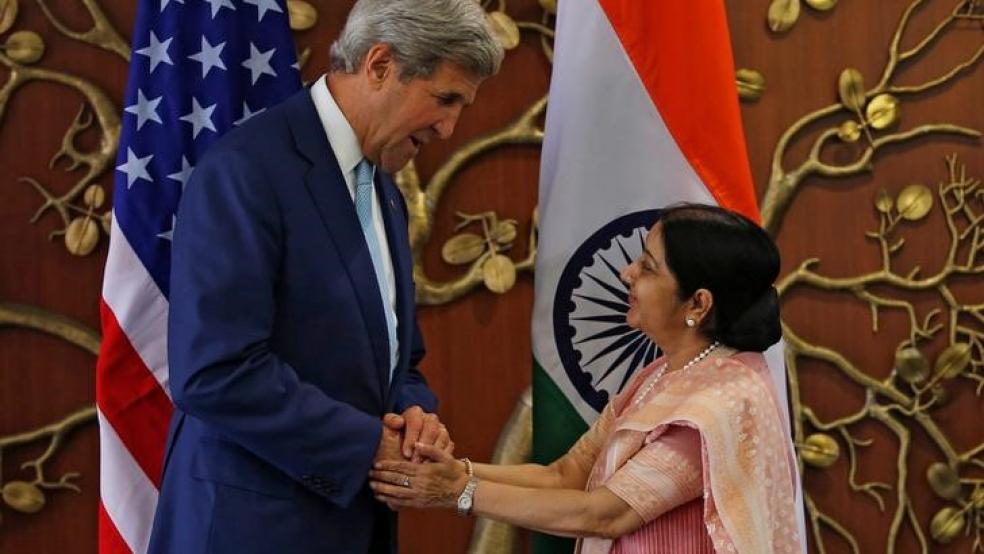NEW DELHI (Reuters) - The United States and India pledged on Tuesday to deepen security and commercial ties at the start of an annual U.S.-India strategic dialogue in which tension with Pakistan over the disputed Kashmir region will also be discussed.
U.S. Secretary of State John Kerry and Commerce Secretary Penny Pritzker led the U.S. delegation in talks with senior Indian government officials in the capital New Delhi. "It couldn't come at a more important moment," Kerry said in his opening remarks. "In both sectors, security and economics, we have room to be able to further grow, and to expand our two-way trade and investment, but also to resolve our security problems in doing that."Kerry cited cyber-security and energy as areas where both countries could expand cooperation. He said the sides had reached an understanding on financing to help India meet its ambitious renewable energy targets."Our plate between our two nations is as full now as it has ever been," added Kerry, who was attending the second Strategic and Commercial Dialogue that will also be the last of the Barack Obama presidency.India's Minister of External Affairs, Sushma Swaraj, said she hoped the next U.S. president would continue the dialogue that also seeks inputs from companies, which this year included e-commerce giant Amazon and wireless technology firm Qualcomm.India is keen to attract foreign investment to back Prime Minister Narendra Modi's "Make in India" initiative while foreign investors are keen for reassurance that Asia's third-largest economy is becoming an easier place to do business.Finance Minister Arun Jaitley briefed U.S. CEOs on a planned Goods and Services Tax that the government hopes to introduce next year and would transform the market of 1.3 billion people into a single market for the first time.KASHMIR TENSIONSIn a meeting with National Security Adviser Ajit Doval earlier, Kerry discussed regional security challenges in South Asia, as well counter-terrorism efforts, said U.S. State Department spokesman Mark Toner.A senior U.S. official said Kerry would urge Modi in a meeting on Wednesday to open talks with neighbouring Pakistan to resolve tension over Indian-ruled Kashmir.Kashmir is at the centre of a decades-old rivalry between nuclear-armed India and Pakistan, which also rules its northern part and backed an insurgency in the late 1980s and 1990s that Indian security forces largely crushed.Dozens of people have been killed in violent protests in Kashmir since July 8, when security forces killed a field commander of Pakistan-based Islamist militant group who enjoyed widespread support in the Muslim-majority region.Modi has said India will not bow to terrorism and accused Pakistan of glorifying it in his annual Independence Day speech on Aug. 15, in which he also raised the rhetorical stakes by highlighting concerns about human rights in restive regions of Pakistan.New Delhi has rejected Pakistan's invitation to hold talks on the future of Jammu and Kashmir, India's northernmost state, saying it is an integral part of the nation. It also says any talks should address cross-border terrorism in Indian-ruled Kashmir - something Pakistan denies any role in."We have a long-standing policy of encouraging and advocating for great dialogue between the two countries on addressing areas of difference, and that continues to be our position," a senior U.S. official said before the talks."But we have also underscored that combating terrorism is a high priority for the United States in its bilateral relations with all of the countries in the region," the official added.Afghanistan would also be discussed, the official said, amid closer ties between India and Afghanistan, which is likely to aggravate fears in Pakistan of being wedged between two hostile neighbours.India has provided a little over $2 billion in economic assistance to Afghanistan in the last 15 years and said recently it would deliver more arms to Afghanistan. (Editing by Douglas Busvine and Simon Cameron-Moore)U.S., India pledge deeper security and commercial ties

ADNAN ABIDI



